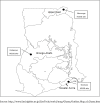Factors Influencing Health Facility Delivery in Predominantly Rural Communities across the Three Ecological Zones in Ghana: A Cross-Sectional Study
- PMID: 27031301
- PMCID: PMC4816577
- DOI: 10.1371/journal.pone.0152235
Factors Influencing Health Facility Delivery in Predominantly Rural Communities across the Three Ecological Zones in Ghana: A Cross-Sectional Study
Abstract
Background: Maternal and neonatal mortality indicators remain high in Ghana and other sub-Saharan African countries. Both maternal and neonatal health outcomes improve when skilled personnel provide delivery services within health facilities. Determinants of delivery location are crucial to promoting health facility deliveries, but little research has been done on this issue in Ghana. This study explored factors influencing delivery location in predominantly rural communities in Ghana.
Methods: Data were collected from 1,500 women aged 15-49 years with live or stillbirths that occurred between January 2011 and April 2013. This was done within the three sites operating Health and Demographic Surveillance Systems, i.e., the Dodowa (Greater Accra Region), Kintampo (Brong Ahafo Region), and Navrongo (Upper-East Region) Health Research Centers in Ghana. Multivariable logistic regression was used to identify the determinants of delivery location, controlling for covariates that were statistically significant in univariable regression models.
Results: Of 1,497 women included in the analysis, 75.6% of them selected health facilities as their delivery location. After adjusting for confounders, the following factors were associated with health facility delivery across all three sites: healthcare provider's influence on deciding health facility delivery, (AOR = 13.47; 95% CI 5.96-30.48), place of residence (AOR = 4.49; 95% CI 1.14-17.68), possession of a valid health insurance card (AOR = 1.90; 95% CI 1.29-2.81), and socio-economic status measured by wealth quintiles (AOR = 2.83; 95% CI 1.43-5.60).
Conclusion: In addition to known factors such as place of residence, socio-economic status, and possession of valid health insurance, this study identified one more factor associated with health facility delivery: healthcare provider's influence. Ensuring care provider's counseling of clients could improve the uptake of health facility delivery in rural communities in Ghana.
Conflict of interest statement
Figures
References
-
- WHO. Trends in maternal mortality: 1990 to 2013 Geneva, Switzerland: WHO, UNCEF, UNFPA, the World Bank & UNPD; 2014.
-
- WHO. Levels & trends in child mortality report 2014 Geneva, Switzerland: WHO, UNICEF, UNFPA, the World Bank, & UNPD; 2014.
-
- Ministry of Health. Ghana MDG acceleration framework and country action plan: maternal health Accra: Ministry of Health, Government of Ghana and United Nations Country Team in the Republic of Ghana; 2011.
-
- Ghana Statistical Service. Millennium development goals in Ghana Accra, Ghana: Ghana Statistical Service; 2013.
-
- GSS, GHS, ICF International. Ghana demographic and health survey 2014 Accra, Ghana: Ghana Statistical Service, Ghana Health Service, and ICF International; 2015.
Publication types
MeSH terms
LinkOut - more resources
Full Text Sources
Other Literature Sources
Medical
Miscellaneous


